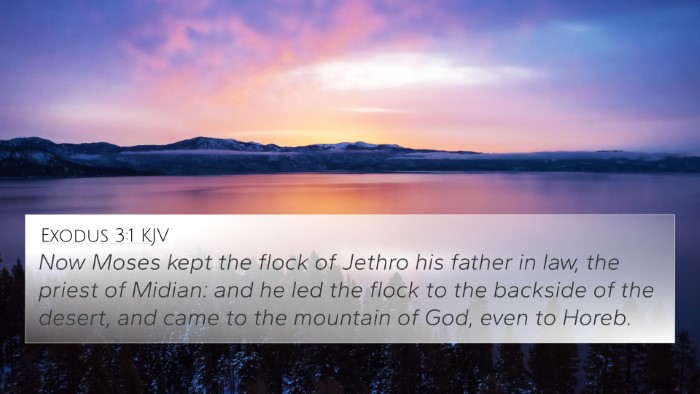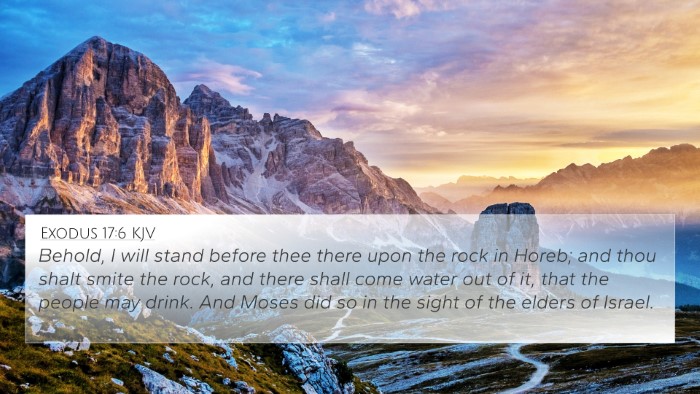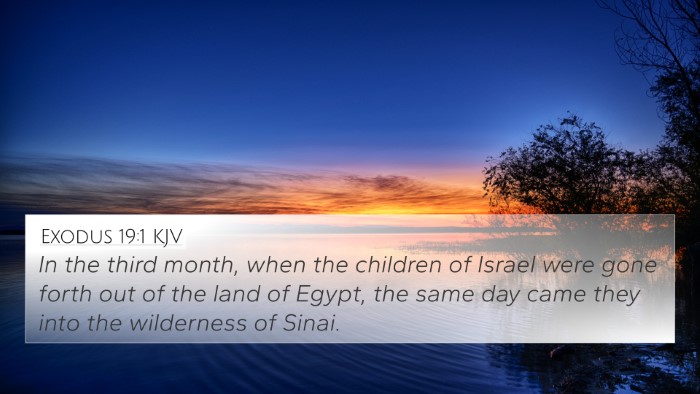Meaning and Interpretations of Deuteronomy 1:6
Deuteronomy 1:6 reads: "The LORD our God said to us at Horeb, 'You have stayed long enough at this mountain.'" This verse marks a pivotal moment in the Israelites' journey, emphasizing the call to move forward and the importance of timing in God's plan. Below, we provide a comprehensive summary of insights derived from public domain commentaries to enhance understanding.
General Overview
This verse occurs in the context of Moses recalling the covenant and the journey of the Israelites as they prepare to enter the Promised Land. The call to leave Horeb signifies the transition from a phase of preparation to action, underscoring a significant theme of progression in the journey of faith.
Commentary Insights
-
Matthew Henry's Commentary:
Henry emphasizes the significance of Horeb as a place of divine encounter and revelation. He notes that God's command to leave serves not only as a literal directive but also as a spiritual metaphor for progress in our relationship with Him. It echoes the sentiment that believers must not become complacent but strive for spiritual growth.
-
Albert Barnes' Notes:
Barnes points out the context of Horeb as the site of the giving of the Law. He interprets God's statement as a reminder that the lessons learned at this significant site must now be applied in the journey ahead. Staying too long in one place may lead to stagnation, and Barnes encourages moving forward in faith based on God's revelations.
-
Adam Clarke's Commentary:
Clarke highlights the importance of God's timing in this verse. He remarks that Horeb was a place of spiritual formation, and there comes a time when one must transition from learning to acting. The departure signifies readiness to embrace new challenges and experiences under God's guidance.
Thematic Connections
Deuteronomy 1:6 resonates with various themes throughout Scripture. Below are some associated themes and potential cross-references:
- Progress and Movement: The concept of moving from one stage of life to another is echoed in Philippians 3:13-14, where Paul reflects on pressing forward towards the goal.
- Obedience to God's Call: In Isaiah 6:8, there is a willingness to respond to God's call, emphasizing the importance of readiness to act.
- Divine Revelation and Guidance: Psalm 119:105 speaks of God's Word as a light for our path, indicating that guidance often precedes action.
- Spiritual Growth: Reference to 2 Peter 3:18 encourages growth in grace and knowledge, paralleling the notion of moving beyond a stationary faith.
- The Promise of New Lands: Joshua 1:2 highlights the call to enter the Promised Land, drawing a direct connection to this transition.
- Faith in Action: The imperative found in James 1:22 to be doers of the Word aligns with the necessity of leaving Horeb to fulfill God's plan.
- Expectation of Transition: Matthew 28:19-20, the Great Commission, calls for action in spreading the Gospel, reflecting the essence of moving forward assigned in Deuteronomy 1:6.
Bible Cross-Reference Analysis
By engaging in cross-referencing Biblical texts, readers can enrich their understanding of how Deuteronomy 1:6 connects to the broader narrative of Scripture:
- Linking Deuteronomy 1:6 with teachings from Hebrews 11:1 illuminates the theme of faith as assurance of things hoped for, advocating readiness to transition when prompted by God.
- A comparative analysis of John 15:16 reflects that believers are chosen and sent forth, similar to how the Israelites are called to move forward from Horeb.
- Comparative study with Ephesians 5:15-16 encourages readers to make the best use of time, connecting the urgency implied in moving on from Horeb.
- Insights from Colossians 1:10 emphasize bearing fruit in every good work, further establishing a theme of action following God’s leading.
- Exploring 1 John 2:6, which states that whoever claims to live in Him must walk as Jesus did, parallels the call to action and faith demonstrated in Deuteronomy 1:6.
Conclusion
In conclusion, Deuteronomy 1:6 serves as a powerful reminder of God's call for His people to advance in their spiritual journeys. By understanding the implications of this command and exploring its connections through a Bible cross-reference guide, believers can deepen their insight into God's purpose for their lives. Utilizing tools for Bible cross-referencing can yield transformative insights and foster growth as we follow God's directives. Engaging with related verses and their thematic connections not only illuminates individual understanding but also enhances the collective experience of the faith community.
Call to Action
For those interested in a deeper exploration of Biblical texts, consider utilizing Bible reference resources and Bible concordance tools for effective cross-referencing. Understanding the inter-Biblical dialogues allows for a rich study of Scripture and can provide clarity in the journey of faith.







